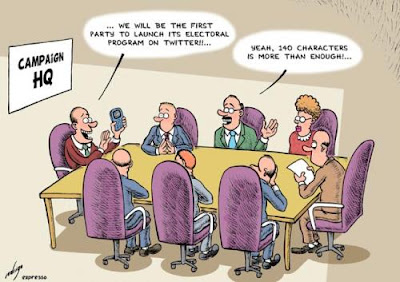Cleggmania is generating a huge amount of literature (is it too big a word?) on the subject of third way politics. I came across this article by David Mitchell in the Observer (David Cameron feels the hand of history where it hurts) and it was one of those articles that you read while constantly nodding your head in agreement.
You see the LibDem breakthrough is an interesting phenomenon for those of us who have long been advocating about the harm of duopolistic scenarios. One of the strongest arguments, at least in our opinion, is the lack of incentive for new ideas when the battle is shorn down to a two-way race. Opposition by default has a nasty habit of just creating two clones with different names in the long-run – a very unhealthy prospect for healthy development. Here is Mitchell’s (part of ) take on the issue (my highlights):
“You’re sick of the government, aren’t you? So vote for me!” is how British opposition leaders have always addressed the electorate. It’s usually enough. “Why commit to policies in advance when I can win just by not being Gordon Brown?” Cameron must have thought. It doesn’t exactly make him a statesman but doesn’t mean he’s an idiot either. He analysed his strategic objective and, in time-honoured fashion, organised a perfectly competent cavalry charge. It had always worked in the past. And then history opened up on him with a machine-gun.
It feels like something may be changing, and this could be real change rather than the mere alternative that Cameron offers. The apathy and disillusionment of the electorate may be turning into something more constructive than moaning about politicians being the same, not bothering to vote or telling ourselves that Ukip isn’t racist. Instead people are beginning seriously to question the two-party system. That’s why Cameron’s strategy, to everyone’s surprise, isn’t working.
The public’s reasoning may have gone like this: “The Tories represent change, in that electing them would result in a change of government. But somehow I’m not sure they’d be a better government, just a different one. And, in fact, there’s something eerily familiar about them. Big business seems to back them. Does that mean they’re nice? Hmm.
“Oh, it doesn’t make any difference who you vote for, does it? They all use the same platitudes. I wish they could all lose. I suppose that means I want a hung parliament? People seem to think that could happen. And everyone says Nick Clegg won the first leadership debate. I only saw a bit of it myself, but I’m quite glad – he was the underdog. Maybe I’ll vote for him? That might give the LibDems a bit more influence if there’s a hung parliament. Also, it might keep the Labour/Tory [delete as applicable] candidate out in my constituency.
“Actually, wait a minute! I feel quite good about Nick Clegg now! Nick Clegg and a hung parliament! And the LibDems want proportional representation which would mean there’d always be a hung parliament. Would that matter? It seems interesting.”
I hope people have been thinking along those lines because I believe that that’s the sort of typically British, ponderous and cynical reasoning that could bring about proper reform. Historically, we don’t change things out of ideological zeal – we change them when enough is enough. We’re sick of a system where all a party leader needs to do to win power is convince us that he’s not as bad as his rival. In a proportionally representative hung parliament, politicians may have to win arguments, talk about all their policies, not just scaremonger about the taxes or cuts that they claim their opponents are planning.
I’m speaking too soon but all this makes me optimistic. The savage and irresponsible response from the Tories and the right-wing press to Clegg’s popularity boost reinforces my belief that something might be happening. Otherwise the Tory papers wouldn’t be using words like “Nazi” and even more damaging ones like “donations”. And senior Conservatives wouldn’t imply that a hung parliament would usher in a sort of governmental apocalypse.
The truth is, for them, it might. No party has done better under the old system than the Conservatives – they’ve enjoyed decades in office. But a hung parliament resulting in electoral reform could mean they never form a majority government again. They’re feeling the hand of history where it hurts.
That’s more than an nutshell quote. We are familiar with “the savage and irresponsible responses” (cue Stephen Calleja’s tiddlers). We are familiar with the perception of disgruntlement with two -party politics (I H8 PLPN). What description will the Maltese voting public fit into? Are they prepared to “seriously question the two-party system”? Are they also sick of the system where “all a party leader needs to do to win power is convince us that he is not as bad as his rival”?
Will there be anyone prepared to harness this momentum and transform it into the necessary third party? The LibDems in the UK also face an “unfair” electoral system. In the UK there seems to be a growing consensus for the need to change electoral law. There will of course always be those who are against such a change – particularly those who (like the Tories in Mitchell’s account) can only stand to gain by preserving the status quo.
There are Faustos in the UK who will answer that it is not the system but the voters who need to change. Would our system allow a series of three way televised debates? Would it give PN, PL and a third party equal exposure? That validation was a huge step for Nick Clegg.
Something is telling me that in Malta the tiddlers will have to swim against the current for a while longer.



